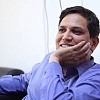Global Media in Days of Information Warfare
In
Log in if you are already registered
In the days of mediatization when it is mostly media which sets agenda and information war fare decides public perception ,it is very important for common news consumers to understand how good or bad is information warfare in corporate media. And for this Sputnik news spoke exclusively to Texas State University distinguished Professor Prof Steven Beebe ,who is also Visiting Professor at Oxford University. I begun by asking:
Q-1:Mediatization is an old but slow phenomenon.It basically defines the role of media in setting up Agenda and then allow political establishment to follow.It also intervene in decision making process of civil society and politician.Sir what do you think,how this process of mediatization is going to influence politics and society in coming days/years?
Prof Steven-Although the mediazation or agenda-setting function of the media is a concept that has been around for several decades, I do think it is a useful metaphor to explain some, certainly not all, aspects of politics and what people talk about. I wonder, for example, if Donald Trump’s political antics would be something I would be incorporating as part of this response if the media did not continue to emphasize his behavior. Media coverage begats media coverage. And to some degree media coverage influences our interpersonal conversations as well. My primary area of expertise is in communication skill development rather than mediazation theory. I am especially interested in how the media and other aspects of technology influence our interpersonal communication. Contemporary media stories do influence what we talk about in our conversations. And depending on the news source or media bias, the news story may also influence how we think as well as what we think about the topic.

Prof Steven Beebe Image credit: www.natcom.org
Q-2:We are living in increasingly connected world and in a transparent world? Media specially news media is living under immense pressure of putting information first among their news consumers.This and several other factors have led to an information war fare.Could you please elaborate this term a bit more with some prevailing example?
Prof Steven- I don’t think it’s new that media outlets compete. News organizations want to be first to solidify their prominence. Whether it is Donald Trump in U.S. politics, a recent terrorist strike, or other “breaking news” story, media outlets seek to break the news and scoop their competition.
Q-3:How different is media war fare in west and in countries like Russia, India and China?
Prof Steven- The difference lies in the restricted freedom of the press that occur in some of the countries that you identify. Concern for the consequences of what will occur is certain stories are broadcast is a very real concern. Although I have not been to India, my brief experience in Russia and China suggest that there are differences in press freedom in these countries.
Q-4:What kind of fear top media people face in terms of their success and sustainability as star or icon among their target audience?
Prof Steven-Survival. Whether being an on-air talent or working behind the scenes (where there is more stability) there is concern about longevity in a media career. As in most careers, there is competition, ageism, and other factors that influence the marketability and career health of media employees.
Q-5:In a media environment and in your opinion what is more important for success of a media entity-Star or Iconic Journalist or News?
Prof Steven-It is important that the media “star” engender a positive emotional response from his/her listeners/readers. How a media personality makes the reader/listener feel is vital. Appearance, skill, timing, aptitude all contribute to how someone makes another person feel—emotional response to the communicator is one of the central factors in “likability” and popularity.
Q-6- In what direction Media War Fare leading? Will it give a boost to news media in terms of good content or it will decline in terms of news value?
Prof Steven- There will always be competition to get the story first and get the story accurately. So I see no major changes in the criteria used to evaluate media. Technology and its multiple media outlets mean that speed has increased as a criteria. I see the continuation of more niche journalism and the customization of media to individual listeners and readers.
Q-7- I am citing three example where media war fare led iconic journalists to resign or shift their loyalty-1- Oprah Winfrey 2- Larry King who has joined Russia Toady 3- Jermey Clarkson of Top Gear on BBC.
Prof Steven-Media stars will continue to exist. The public enjoys learning about, seeing, hearing what celebrities do; media celebrities are no different than other celebrities. Whether it is Brian Williams or Jermy Clarkson, media stars are not immune from ethical standards and behavior. But the public will remain interested in individuals who have made a long-term emotional impression on them. Again, I think emotional response is key—whether its an emotional response to a person, news organization, or technology channel. How a message makes us feel is central to influencing the message’s power, importance, staying power, and prominence.
Thank you for the opportunity to share these thoughts.
Journalist / Acdemic / Writer and NASA Certified Educator
Blog: India and Beyond
Rating: 0




